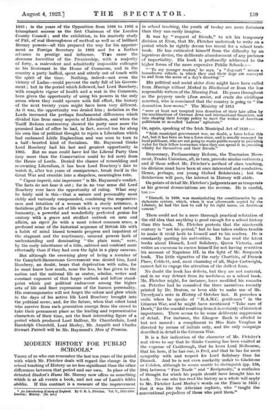MODERN HISTORY FOR PUBLIC SCHOOLS.*
THOSE of us who can remember the last ten years of the period with which Mr. Fletcher deals will regard the change in the school teaching of History as no less significant than the other differences between that period and our own. In place of the detested Student's Hume Mr. Murray now offers us something which is at all events a book, and not one of Lamb's bihtia abiblia. If this contrast is a measure of the improvement • An Introductory History of England. By C. a. L Fletcher. Vol. V., 1815-1880. London Murray. Pa. net.)
in school teaching, the youth of to-day are more fortunate than they can easily imagine.
It was by " request of friends," to wit his temporary division at Eton, that Mr. Fletcher undertook to write on a period which he rightly deems too recent for a school text- book. He has extricated himself from the difficulty by an ingenious device, the deliberate abandonment of any pretence of impartiality. His book is professedly addressed to the higher forms of the more expensive Public Schools :-
" ' To my younger readers,' he says, ' a " dog-cart " means a horsedrawn vehicle, in which they and their dogs are conveyed to and from the scene of a day's shooting."
His political and social obiter dicta might have been culled from Musings without Method in Blackwood or from the less responsible writers of the Morning Post. He poses throughout as the peppery uncle (Jam senior, sed cruda deo viridisqua senectus), who is convinced that the country is going to " the demnition bow-wows." The Ministry of 1815 " were at least not tempted into desertion of their late allies by the machinations of German Jews and international financiers, no into shaping their foreign policy to meet the wishes of Americas politicians or so-called Labour' agitators."
Or, again, speaking of the Irish Municipal Act of 1840 :-
"Irish municipal government was, no doubt, a farce before this Act, but it has been no less a farce since, and is usually managed by local publicans, who are not going to waste public money in providing water for their fellow townsmen when they can spend it in providing whisky for themselves and their friends.'
Democracy, Parliamentary Reform, the Tractarian Move- ment, Trades Unionism, all, in turn, provoke similar outbursts and if these reflect Mr. Fletcher's method of class teaching, his division must have been at once interested and combative. Hence, perhaps, our young Oxford Bolshevists ; but the Bolshevism will pass, the interest in History will abide.
On points of detail Mr. Fletcher's judgments are as temperate as his general denunciations are the reverse. He is candid, too :—
"Disraeli, in 1869, was manipulating the constituencies by an elaborate system, which, when it was afterwards copied by the Liberals, he had the face to call by its right name, an American caucus."
There could not be a more thorough practical refutation of the old idea that anything is good enough for a school history than this book. Mr. Fletcher protests that the nineteenth century is " not his period," but he has taken endless trouble to make it vivid both to himself and to his readers. He is constantly quoting his authorities. He has read the latest books about Disraeli, Lord Salisbury, Queen Victoria, and writes an excursus to excuse himself for not having rewritten his account of Napoleon III, in the light of Mr. Simpson's book. The little vignettes of the early Chartists, of Francis Place, Cobbett, and, most charming of all, Major Cartwright, cannot fail to engage the attention of the dullest form.
No doubt the book has defects, but they are not material, and in no way detract from its usefulness as a school book. Mr. Fletcher might, for instance, have modified his remarks on Petcrloo had he consulted the three narratives recently printed by Dr. Bruton, or been able to make use of Mr. Trevelyan's note in History of October last. It provokes a smile when he speaks of " R.A.M.C. gentlemen " in the Crimean War, and he might have mentioned " Take care of Dowb," for the scandal resulting from it is certainly of historical importance. There seems to be' some deliberate suppression of detail. For instance, the Glasgow Bank is alluded to but not named : a compliment to Miss Kate Vaughan is directed by means of initials only, and the only campaign described in detail is the Crimean War.
It is a fair indication of the character of Mr. Fletcher's real views to say that he thinks Canning has been exalted at the expense of Castlereagh, that he loves Lord Melbourne, that his hero, if he has one, is Peel, and that he has far more
sympathy with and respect for Lord Salisbury than for Disraeli. And he is not even markedly unfair to Gladstone or Cobden, although he seems unable to distinguish (pp. 158,
294) between " Free Trade " and " Reciprocity," a confusion of thought for which his pupils should have brought him to book. No one who has read the history as a whole will apply to Mr. Fletcher Lord Morley's words on the Times in 1855 that it was like the Athenian sophists, who " taught the conventional prejudices of those 'who paid them,"


































 Previous page
Previous page